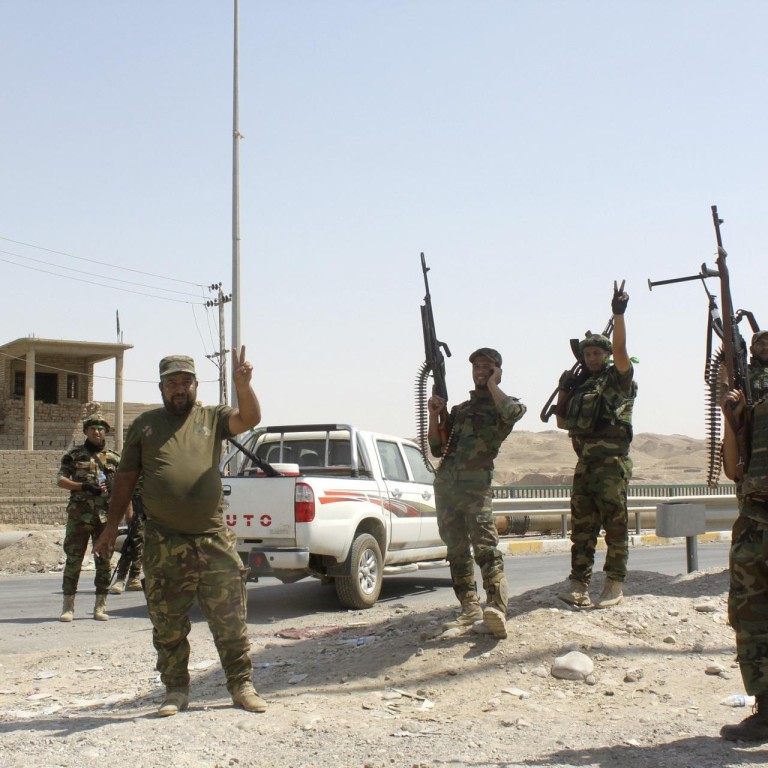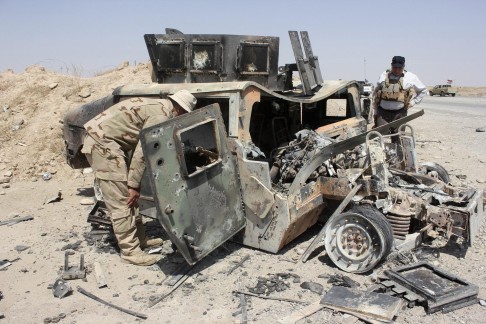
Iraqi forces press the advantage after breaking Jihadist siege of Shiite town
Fightback against Islamic State gathers pace as government troops backed by Kurdish fighters and Shiite militiamen enjoy biggest success
Iraqi troops, Kurdish fighters and Shiite militiamen backed by American strikes pressed a fightback against jihadist-led militants yesterday, buoyed by breaking the 11-week siege of a Shiite town.
The breakthrough to the town of Amerli is the biggest success for the Iraqi government since Islamic State militants overran much of the Sunni Arab heartland north and west of Baghdad in June.
It came as the United States carried out air strikes in the area, the first time it has expanded its three-week air campaign against Islamic State beyond the Kurdish-controlled north.
The mainly Shiite Turkmen residents of Amerli were endangered both because of their faith, which jihadists consider heresy, and their resistance to the militants, which has drawn harsh retribution elsewhere.
Iraqi forces kept the momentum of their advance, with Kurdish peshmerga fighters and Shiite militiamen retaking Sulaiman Bek, a town north of Amerli that had been a militant stronghold.
Sulaiman Bek was under the control of the combined forces but there was still danger from bombs the militants may have left behind, said Shallal Abdul Baban, the official responsible for the nearby Tuz Khurmatu area.
Iraqi soldiers, peshmerga and Shiite militiamen had also surrounded the town of Yankaja and were pounding it with artillery.
The operation to free Amerli was launched on Saturday after days of preparations in which Iraqi security forces, Shiite militiamen and Kurdish fighters deployed for the assault and Iraqi aircraft carried out strikes.

The US said it had carried out four air strikes in the Amerli area, expanding its air campaign outside northern Iraq. In doing so, it is supporting operations involving militia forces that previously fought against US troops in Iraq.
Australia, Britain, France and the US have also airdropped relief supplies to Amerli.
But Western aid for Amerli was slow in coming, with the burden of flying supplies and launching strikes largely falling to Iraq's fledgling air force.
Kurdish forces backed by US air support have succeeded in clawing back some areas lost to the jihadis last month.
The US military said on Sunday that it had carried out an air strike against an armed Islamic State vehicle near Iraq's largest dam, north of the militant-held city of Mosul.
Kurdish forces and elite federal troops retook the dam after briefly losing it to the jihadis in August, securing the source of power and irrigation water for the region around Iraq's second city.
West of Baghdad, two suicide bombers targeted security forces in the city of Ramadi on Sunday, killing 13 and wounding 17.
Islamic State controls a large swathe of northeastern Syria and northern and western Iraq.
Washington has said that operations in Syria will be needed to defeat Islamic State, but has so far ruled out cooperation with the Damascus regime.
It has, however, attempted to enlist the support of long-time foe Tehran, a key backer of Syrian President Bashar al-Assad.
US Secretary of State John Kerry has urged "a united response led by the United States and the broadest possible coalition of nations".
Both Islamist fighters and Iraqi government forces had committed atrocities in three months of fighting, senior UN officials said.
There was "strong evidence" that fighters from Islamic State and linked groups had carried out targeted killings, forced conversions, abductions, sexual abuse and torture, UN Deputy High Commissioner for Human Rights Flavia Pansieri said.
Iraqi police had executed detainees while Iraqi soldiers had shelled towns and carried out air strikes killing and injuring civilians, Pansieri said, opening the meeting of the UN Human Rights Council in Geneva.
The 47-member state forum is expected to agree to Baghdad's request to send a team of UN experts to investigate.
